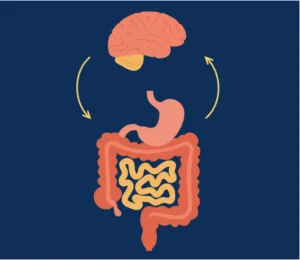Blog

Gut Health & Gratitude: Nourishing More than Your Microbiome
As we move deeper into the season of cozy meals and connection, gratitude is everywhere. It's handwritten on pumpkin décor, sprinkled through dinner conversations, and tucked into social media captions. But beyond being a lovely sentiment, gratitude is a powerful physiological state.
Gratitude can influence your nervous system, your sense of calm, and even the way your body digests and experiences nourishment.
In other words: how you feel changes how you digest.
And when you practice gratitude, you’re not just feeding your microbiome, you’re nourishing your entire ecosystem.
The gut–brain conversation
Your gut and brain are in constant communication through a complex network called the gut–brain axis. The vagus nerve is a long nerve running from the brainstem down through your digestive tract.It acts as a main messenger between the two.
When you’re stressed, anxious, or rushing through the day, your body naturally prioritizes alertness and protection over rest and digestion. This might manifest as bloating, a “nervous stomach,” or appetite changes.
In contrast, when you feel calm, connected, or genuinely grateful, your body tends to shift toward a state of relaxation that supports ease, both emotionally and physically. Meals are often experienced as more satisfying and comfortable in this state.
You could eat the most nutrient-dense meal in the world, but if you’re eating it in a state of stress or distraction, it can be harder for your body to receive it fully.
The emotional side of digestion
Our gut doesn’t just process food, it responds to emotion. Sometimes referred to as “the second brain,” the gut contains an extensive network of nerve cells that communicate directly with the brain.
This is why emotional states so often show up physically in the gut:
Stress or worry might bring on bloating or butterflies.
Grief or loss can affect appetite or energy.
Chronic tension can manifest as a “tight” stomach or sluggish digestion.
These physical reactions aren’t “in your head.” They’re your body’s way of reflecting what your nervous system is experiencing.
On the other hand, emotions like calm, joy, and gratitude often help the body feel more settled and receptive. Gratitude activates brain regions linked to empathy and safety. This quiets the stress response and helps the body shift into a state that supports restoration.
Gratitude as nourishment
You don’t need a lengthy meditation practice to benefit from gratitude. Sometimes it’s as simple as slowing down for a breath or moment of awareness.
A few gentle ways to bring gratitude into your daily rhythm:
Take one slow breath before you eat.
That single pause can help you arrive in the present moment.Notice your food.
Think about where it came from — the soil, the sun, the hands that prepared it.Put your fork down between bites.
It’s a small act of mindfulness that makes meals more peaceful.Avoid multitasking while eating.
Digestion is sensory, and being present allows for fuller enjoyment.Reflect after meals.
Notice how your body feels.Does it feel satisfied, energized, grounded?
These small rituals sound simple, but over time they can change the way your body and mind experience nourishment.
Nourishment beyond food
So many conversations about gut health focus on what to eat, which is important, but equally powerful is how we receive nourishment.
Digestion mirrors the way we process life. When we’re rushing, distracted, or emotionally constricted, our digestive system often follows suit. When we create space for rest, gratitude, and pleasure, our internal rhythms can settle.
Nourishment happens in many forms:
The food we eat
The way we breathe
The company we keep
The thoughts we hold about our bodies
Gratitude touches all of these layers. It’s a reminder that nourishment doesn’t just come from nutrients, it also comes from the quality of presence we bring to them.
The science catching up
Research continues to explore what holistic traditions have long recognized: our emotions, microbiome, and nervous system are deeply connected.
Early studies suggest that gratitude practices can support physiological calm. This reduces stress hormones, supports heart rate variability, and promotes overall well-being. Emerging evidence also points to connections between emotional state and microbial diversity in the gut.
While we may not yet understand every mechanism, what’s clear is that the way we feel influences the way our body functions.
A gentle reminder
As we move through this season of abundance and reflection, I invite you to think of nourishment in its fullest sense.
Nourishment is the soup simmering on your stove, but it’s also the quiet breath before you take a bite. It’s the moment of laughter at the table, the gratitude that softens your shoulders, the reminder that your body is not just a collection of organs,Your body is a living, responsive ecosystem. When we feed that ecosystem with gratitude, we give our bodies permission to rest, digest, and thrive.
So this November, let gratitude be part of your gut health ritual, not as a supplement or prescription, but as a simple, mindful way of caring for yourself from the inside out.
If your digestion has felt off physically or emotionally, this season might be a good time to reconnect with your body’s natural rhythm.
Want to learn more about how I support gut and hormone health, click here to schedule a 15 minute discovery call to learn more.

